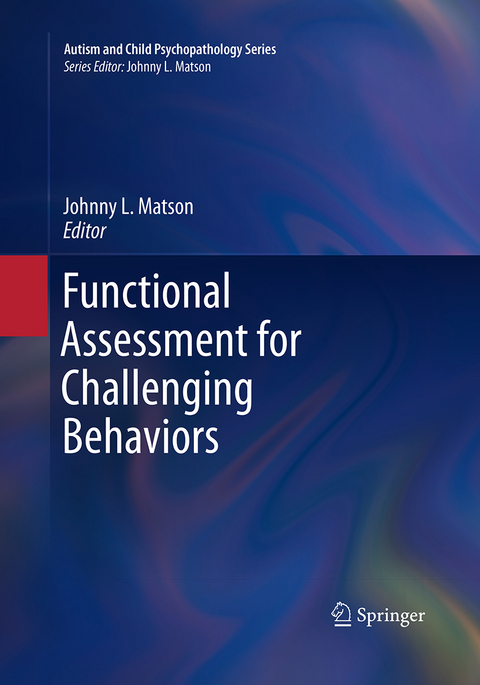
Functional Assessment for Challenging Behaviors
Springer-Verlag New York Inc.
978-1-4939-4127-8 (ISBN)
Comprehensive in coverage, Functional Assessment for Challenging Behaviors expands the knowledge base by providing information on all aspects of its topic. This unique volume addresses basic questions in salient detail, from types and rates of challenging behaviors to populations that warrant functional assessment. In addition, it examines typical assessment techniques, including interview, scaling, experimental, and in vivo methods. The use of functional assessment in treatment planning – and in combination with other interventions – is covered in depth. An especially timely chapter identifies key ethical and legal concerns in working with challenging behavior populations.
Coverage includes:
The history of behavior analysis and functional assessment.
The nature, prevalence, and characteristics of challenging behaviors.
Interview and observation methods in functional assessment and analysis.
Experimental functional analysis for challenging behaviors.
Treatment methods commonly used with functional assessment.
Using functional assessment in treatment planning.
Functional Assessment for Challenging Behaviors is an essential resource for researchers, scientist-practitioners, and graduate students in clinical child and school psychology, pediatric psychiatry and medicine, social work, rehabilitation, and developmental psychology.
Johnny L. Matson is Professor and Distinguished Research Master, and Director of Clinical Training in the Department of Psychology at Louisiana State University in Baton Rouge, LA. Prior to his 25 year tenure at LSU, Dr. Matson was a professor of Psychiatry at the University of Pittsburgh School of Medicine. He is the author of over 600 publications including 34 books, and he is editor-in-chief of two journals; Research in Developmental Disorders and Research in Autism Spectrum Disorders.
Chapter 1. Introduction; J. L. Matson.- Chapter 2. A Brief History of Functional Analysis and Applied Behavior Analysis; D. R. Dixon, T. Vogel, J. Tarbox.- Chapter 3. Nature, Prevalence and Characteristics of Challenging Behavior; R. Didden, P. Sturmey, J. Sigafoos, R. Lang, M. F. O’Reilly, G. E. Lancioni.- Chapter 4. Function of Challenging Behaviors; G. E. Lancioni, N. N. Singh, M. F. O’Reilly, J. Sigafoos, R. Didden.- Chapter 5. Populations and Problems Evaluated with Functional Assessment; J. M. Huete, P. F. Kurtz, R. J. Boyd.- Chapter 6. Methods of Defining and Observing Behaviors; S. Hurwitz, N. F. Minshawi.- Chapter 7. Interview and Observation Methods in Functional Assessment; A. M. Kozlowski, J. L. Matson.- Chapter 8. Experimental Functional Analysis; T. R. Vollmer, H. S. Roane, A. B. Rone.- Chapter 9. In Vivo Assessment: Issues of Real Time Data; M. Horovitz, J. L. Matson.- Chapter 10. Scaling Methods of Functional Assessment; M. Sipes, J. L. Matson.- Chapter 11. Treatment Methods Commonly Used in Conjunction with Functional Assessment; N. M. Rodriguez, W. W. Fisher, M. E. Kelley.- Chapter 12. The Role of Functional Assessment in Treatment Planning; D. A. Napolitano, V. M. Knapp, E. Speares, D. B. McAdam, H. Brown.- Chapter 13. Ethical Issues and Considerations; A. Poling, J. L. Austin, S. M. Peterson, A. Mahoney, M. Weeden.
| Erscheinungsdatum | 30.06.2016 |
|---|---|
| Reihe/Serie | Autism and Child Psychopathology Series |
| Zusatzinfo | IX, 243 p. |
| Verlagsort | New York |
| Sprache | englisch |
| Maße | 178 x 254 mm |
| Themenwelt | Geisteswissenschaften ► Psychologie ► Entwicklungspsychologie |
| Geisteswissenschaften ► Psychologie ► Pädagogische Psychologie | |
| Medizin / Pharmazie ► Medizinische Fachgebiete ► Pädiatrie | |
| Medizin / Pharmazie ► Medizinische Fachgebiete ► Psychiatrie / Psychotherapie | |
| Medizin / Pharmazie ► Physiotherapie / Ergotherapie ► Rehabilitation | |
| Sozialwissenschaften ► Pädagogik ► Sozialpädagogik | |
| Sozialwissenschaften ► Soziologie | |
| ISBN-10 | 1-4939-4127-5 / 1493941275 |
| ISBN-13 | 978-1-4939-4127-8 / 9781493941278 |
| Zustand | Neuware |
| Informationen gemäß Produktsicherheitsverordnung (GPSR) | |
| Haben Sie eine Frage zum Produkt? |
aus dem Bereich


